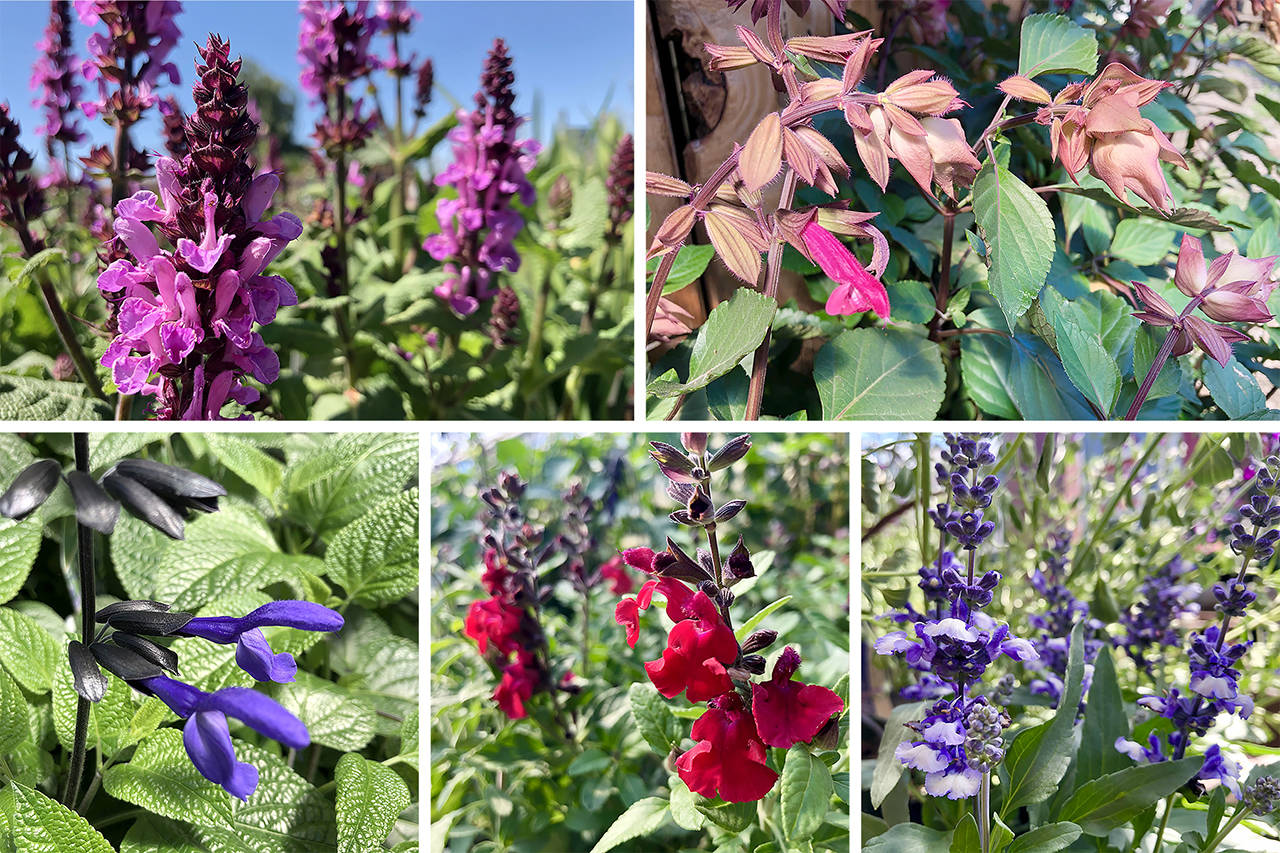For Northwest gardeners, the genus Salvia provides us with a wide range of plants to brighten up our gardens in the summer.
In addition to the culinary Salvia, akasage, these prolific bloomers come in bone-hardy perennials like “East Friesland,” “May Night” and “Caradonna” — all of which have dark blue or purple flowers on 12- to 18-inch stems that bloom in late spring to early summer and will often rebloom if cut back after blooming.
There are true annual ones, like the traditional “Red Hot Sally” that for centuries have been bedded out into mass formal plantings, and also a wide range of varieties that are tender for our area and will sometimes overwinter and come back year after year but are best enjoyed as annuals.
It is this group of tender flavors that seem to have literally exploded in the last 10 years. Here are some that caught my eye the other day while walking through the nursery…
Cathedral Series: This is an improvement on my old-time favorite “Victoria.” “Shining Sea” boasts lavender flowers with white highlights, “Cathedral Purple’” has solid dark purple flowers and “Cathedral Deep Blue” has bluish-purple flowers. All the Cathedral Series varieties are bushy, compact plants that will grow up to 16 inches tall, with the flowers reaching above the foliage, up to 22 inches total. They are perfect for a 12- to 16-inch container.
Mirage Series: The greggii species comes in a wide variety of colors, from rose to salmon and red to purple. “Rose Bi-color” is a nice pink and white, two-toned variety. “Cherry Red” has a nice strong red flower. All of the varieties in the Mirage Weries sport smaller, finer foliage on compact plants that stay under 14 inches tall. Again, these compact varieties work very well in pots.
“Hot Lips”: This microphylla variety is similar to the above greggii varieties, only it can grow to 3 feet tall and just as wide. When it came onto the scene a few years back, it was all we could do to keep it on the tables here in the nursery. While we usually sell it as a tender perennial, I have friends that have managed to keep it alive going on four years now. Bright red flowers with a touch of white bloom all summer, if groomed during the summer. Now you can enjoy “Amethyst Lips,” a new purple version of this prolific bloomer.
“Black and Bloom”: A guaranitica variety with stalks of dark blue flowers emerge from striking black stems amidst green foliage. I had a clump for several years in my front bed that grew to 5 feet tall and 8 to 10 feet across. I can’t begin to tell you how many divisions I have shared with my friends and neighbors. That being said, I think I finally divided it to death — it seems to be gone this year. Opportunity awaits!
“Amistad”: This is another guaranitica variety that came out a couple of years ago and has drop-dead gorgeous deep purple flowers and grows to about 2 to 3 feet tall. With a little protection, I have had this plant bloom well into December with daily visits from our resident hummingbirds. Sadly, it will not survive our winters, so just treat it as an annual. There seem to be several new versions of “Amistad” on the market that look very similar. Just look for that incredible purple flower, and you can’t lose.
“Wendy’s Wish”: The Wish Series features hybrids that are strong growers, topping out at 3 to 4 feet tall and 2 to 3 feet wide. Flowers are a tubular vivid magenta with fluted tips that will attract hummingbirds in droves from late spring until fall. “Embers Wish” has flowers the color of glowing embers, and ‘Love and Wishes’ has deep purple flowers.
All of the above salvias should always be planted in well-drained soil and full sun. They are heat lovers and will languish in too much shade, flop over and be stingy with their blooms. In addition to liking full sun, they are also drought tolerant and will take some abuse from poor watering habits. Best of all, salvias are the consummate hummingbird, butterfly and general pollinator magnet that you will ever find in your garden. Whether in containers or directly into your flower beds, salvias are guaranteed to please.
June is one of the best months to plant in the Northwest. Don’t miss a chance to try out some of these long bloomers — you won’t be sorry you did. Stay safe and keep on gardening.
Steve Smith is the owner of Sunnyside Nursery in Marysville and can be reached at sunnysidenursery@msn.com.
Balcony gardens
Sunnyside Nursery’s free gardening classes are online for now. A “Balcony Gardens” class is scheduled for 10 a.m. June 12 via Zoom. With registration, you’ll receive a Zoom link to attend the online class. For more information or to sign up, visit www.sunnysidenursery.net/classes.
Talk to us
> Give us your news tips.
> Send us a letter to the editor.
> More Herald contact information.
























